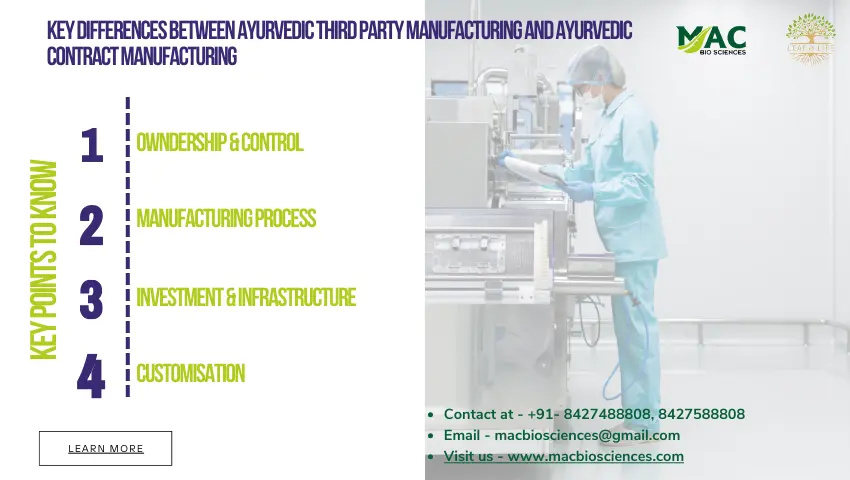Key Differences between Ayurvedic Third Party Manufacturing and Ayurvedic Contract Manufacturing
Key Differences between Ayurvedic Third Party Manufacturing and Ayurvedic Contract Manufacturing

Ayurvedic products have gained significant popularity worldwide for their natural healing properties and holistic approach to wellness. When it comes to manufacturing these products, two common approaches are Ayurvedic third-party manufacturing company and Ayurvedic contract manufacturing. While both methods involve outsourcing production to external entities, they differ in several key aspects.
Ayurvedic Third Party Manufacturing
1. Ownership and Control:
- Involves outsourcing production to a third-party manufacturer.
- Limited control over the manufacturing process and quality assurance.
2. Manufacturing Process:
- Manufacturer produces the product according to their own processes and standards.
- Outsourced production allows businesses to focus on marketing and distribution.
3. Investment and Infrastructure:
- Requires minimal investment in manufacturing infrastructure.
- Ideal for businesses with limited capital seeking to enter the market.
4. Customisation Options:
- Limited customisation options as the manufacturer may have set formulations.
- Products are usually generic and may not be tailored to specific requirements.
5. Quality Control:
- Relies on the manufacturer’s quality control processes and certifications.
- Businesses must ensure that the manufacturer adheres to industry standards.
6. Regulatory Compliance:
- Manufacturer is responsible for ensuring compliance with regulatory requirements.
- Businesses must conduct due diligence to ensure that the manufacturer meets regulatory standards.
7. Intellectual Property Rights:
- Risks of intellectual property infringement as the manufacturer may produce similar products for other clients.
- Businesses must take measures to protect their formulations and proprietary information.
8. Scalability:
- Limited scalability as production capacity is dependent on the manufacturer’s capabilities.
- Businesses may face challenges in scaling production to meet increasing demand.

Ayurvedic Contract Manufacturing
1. Ownership and Control:
- Involves contracting a manufacturer to produce products exclusively for the client.
- Offers complete control over the manufacturing process and product quality.
2. Manufacturing Process:
- Client provides specific formulation and production requirements to the manufacturer.
- Production process tailored to meet the client’s exact specifications.
3. Investment and Infrastructure:
- Involves higher investment in manufacturing facilities and equipment.
- Suitable for established businesses looking for customised production solutions.
4. Customisation Options:
- Offers extensive customisation options, allowing clients to create unique formulations.
- Products can be tailored to meet specific ingredient preferences, potency levels, and packaging requirements.
5. Quality Control:
- Client specifies quality control parameters, ensuring adherence to strict quality standards.
- Allows businesses to maintain control over the quality of their products and brand reputation.
6. Regulatory Compliance:
- Shared responsibility between the client and the manufacturer to ensure regulatory compliance.
- Client may provide specific regulatory guidelines that the manufacturer must follow.
7. Intellectual Property Rights:
- Client retains intellectual property rights over the formulations and products.
- Manufacturer is contractually bound to maintain confidentiality and not disclose proprietary information to third parties.
8. Scalability:
- Offers scalable production capacity to accommodate growing business needs.
- Allows businesses to expand production volume and introduce new product lines more efficiently.
Conclusion:
In conclusion, while both Ayurvedic third-party manufacturing company and Ayurvedic contract manufacturing offer viable options for businesses in the herbal products industry, they have distinct differences in terms of ownership, control, customisation, quality control, regulatory compliance, intellectual property rights, and scalability. Understanding these differences is essential for businesses to choose the most suitable manufacturing approach based on their specific needs and objectives.






 Home
Home Range
Range Call Us
Call Us Whatsapp
Whatsapp Contact Us
Contact Us